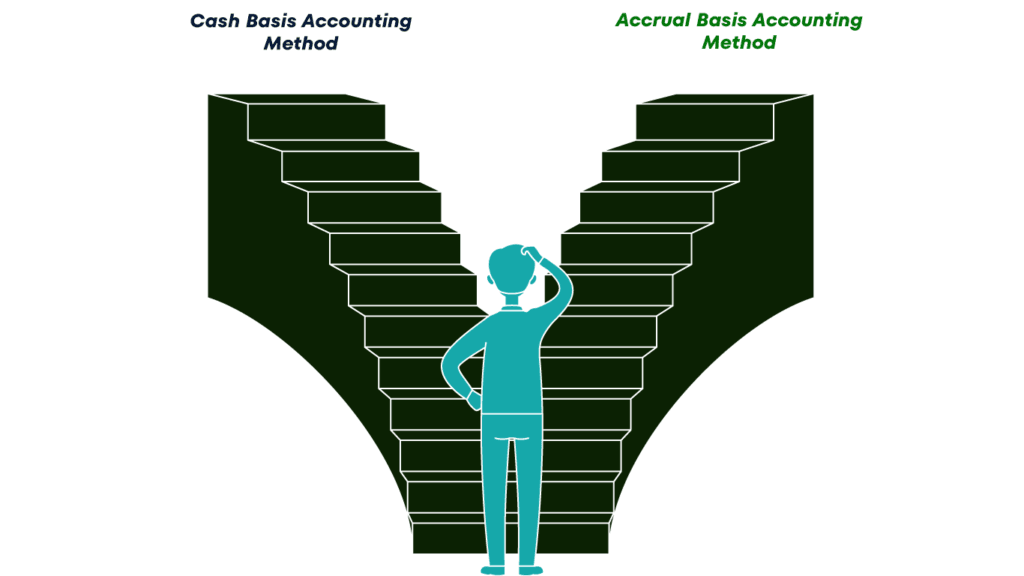In accounting, and tax accounting, accrual basis or cash basis are the methods to recognize income and expenses. In this post I talk about the features of accounting for each of the methods, explain the difference, and help you understand which one is right for your business.

Same case, different accounting method example
Masha owns a small printing shop. She received a large order from a local university to print 1,000 custom textbooks worth 200,000 USD. The university paid 50% upfront (100,000 USD) and agreed to pay the remaining balance upon delivery. Masha will take 2 weeks to complete the printing job.
Masha is glad that the deal has taken place. But one question torments her: when should she recognize 200,000 USD as her income? On the day of acknowledgement of delivery or on the day of receipt of the prepayment?
Under the cash basis method, Masha will immediately recognize the 100,000 USD as income when the unversity paid her that in advance. Then she will have to write off the expenses required for materials immideately. If you pay an employee the salary of two months in advance, you can write it off as an expense immideately.
At first glance, all of it seems simple, but if there are many clients/customers placing order like this, it becomes difficult to keep track of the payment. If any dispute arises, you will have a hard time retracing all the transactions that took place.
Under the accrual basis method, businesses recognize expenses and income in the period they arise. Masha recognizes money from the university as income only after she fulfills her obligations. She also recognizes expenses only when her counterparties meet their obligations. For instance, if Masha pays an employee’s two months salary in advance, she has to divide this expense equally between the two months in her reports.
Cash basis accounting vs accrual accounting method
Cash basis accounting method: When using it, you record income or expenses in the period when the payment occurred, that is, when you received the money or it left the cash desk or current account, or when the organization received or transferred other property.
Accrual basis accounting method: It is associated with the period of the actual conduct of the business transaction. The relevant income or expense must be taken into account on the date of its occurrence according to the documents, that is, at the time when the income or expense was accrued.
Cash Basis Accounting
You record revenue and expenses when cash exchange happens.
Accrual Accounting
You record revenue and expenses when you earn it, or when it incurs.
If you are in a partnership with other corporation which doesn’t fall under the category of “average of gross receipts of 30 million USD for past three years (Adjusted for inflation in 2024)”, you are not eligible for cash basis accounting. The rules for an S Corporation may differ.
Too difficult? Let Absorb Assets do accounting for you!
Advantages and disadvantages of cash basis accounting
There are merits and demerits to cash basis accounting. While it may be beneficial for small businesses in few cases, there are cases where it can cause problems. In worst case scenario, IRS may audit, and fine you. So, weigh the advantages and disvantages carefully.
Advantages
Disadvantages
Advantages and disadvantages of Accrual basis accounting
For businesses, corporations, and enterprises, accrual basis accounting is the recommended way. But if you are just starting out, and don’t have the experience, or reserve balance, you should know your options.
Advantages
Disadvantages
Conclusion
You shouldn’t just choose any accounting method for your business, or for yourself. Both the methods have their pros and cons. You can weigh them to see what’s best for you, and your business. If you have your doubts, you can schedule an appointement with our experts.